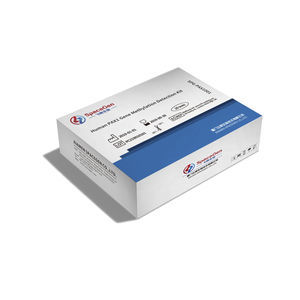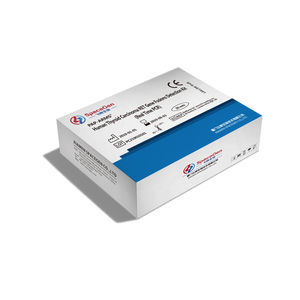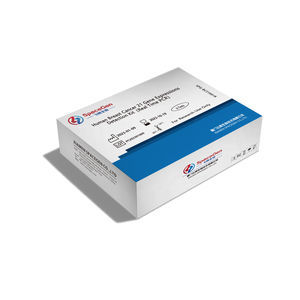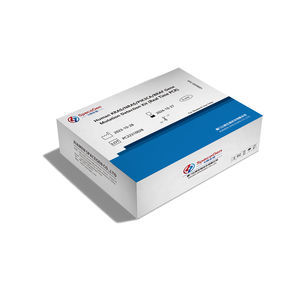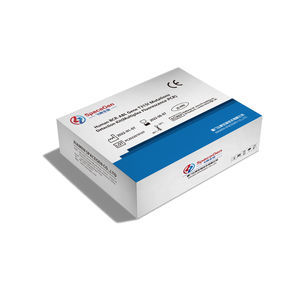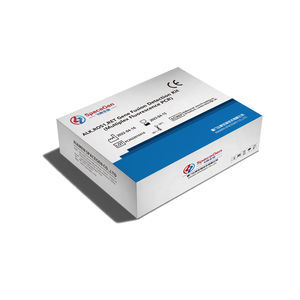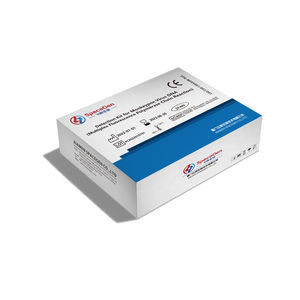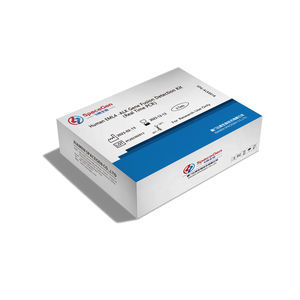

- Company
- Products
- Catalogs
- News & Trends
- Exhibitions
BRAF mutation detection kit PC2022010201colorectal canceroncologyEGFR
Add to favorites
Compare this product
Characteristics
- Applications
- colorectal cancer
- Application field
- oncology
- Tested parameter
- for BRAF mutations, EGFR, lead
- Sample type
- cell
- Result display time
90 min
Description
BRAF gene plays an important role in signal transduction involving cell proliferation, by regulating various kinds of cell physiological activities, such as growth, division , death etc.
BRAF gene is the second transmitter in the EGFR signaling pathway. When BRAF gene mutations occurs, the signal pathway will be permanently auto-activated, resulting in excessive cell proliferation and differentiation, thus, which may lead to EGFR-TKI ineffectiveness. Mutations of BRAF occurred in many cancers such as malignant melanoma, colorectal cancer, lung cancer, thyroid carcinoma, liver cancer,etc.
The NCCN Guidelines for Colorectal Cancer (2023 Edition) recommends that all patients with metastatic colorectal cancer can be genotyped for B-raf and K-ras mutations.
Some of the targeted drugs are designed to directly target the B-raf mutation to provide treatment options.
DETECTION SIGNIFICANCE
1. BRAF V600E mutation makes response to anti-EGFR or anti-HER2 therapies highly unlikely.
2.Select patients for treatment with BRAF/MEK inhibitors based on the presence of BRAF V600E.
3.When MLH1 expression is absent, the presence of BRAF V600E is consistent with sporadic cancer.
4.Molecular diagnostics may be useful to reclassify follicular lesions. BRAF V600E suggests papillary thyroid carcinoma.
FEATURES & ADVANTAGES
1. Accuracy and Reliability: Use pre-load PCR tube to effectively avoid cross-contamination.
2. High Sensitivity: Sensitivity can detect V600E mutations as low as 1%in 10 ng DNA.
4. Great versatility:Validated on the most common qPCR machines with stable results.
DETECTION PROCESS
1.Nucleic Acid Extraction
2.Set up qPCR
3.Amplification
4.Data Analysis
Catalogs
No catalogs are available for this product.
See all of SPACEGEN‘s catalogsRelated Searches
- Assay kit
- Blood assay kit
- Immunoassay assay kit
- Plasma assay kit
- Infectious disease detection kit
- Analysis software
- Molecular test kit
- Respiratory infection test kit
- Whole blood detection kit
- Optical assay kit
- Clinical assay kit
- Fluorescence assay kit
- Viewer software
- Real-time PCR test kit
- Research assay kit
- Laboratory software
- Windows software
- Laboratory detection kit
- Cell assay kit
- Oncology test kit
*Prices are pre-tax. They exclude delivery charges and customs duties and do not include additional charges for installation or activation options. Prices are indicative only and may vary by country, with changes to the cost of raw materials and exchange rates.



